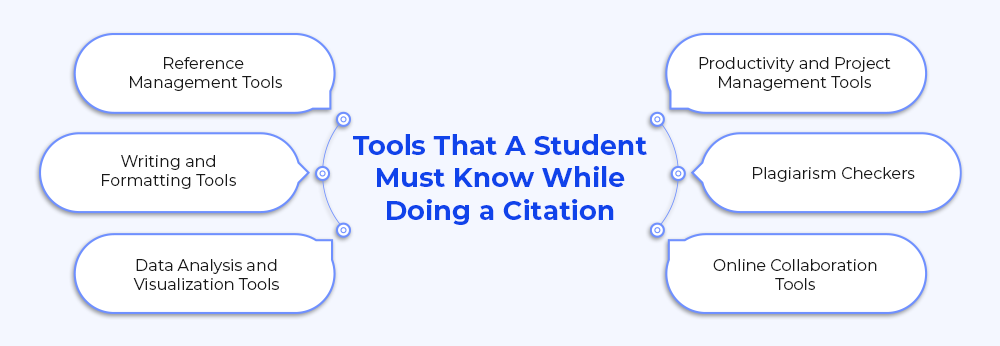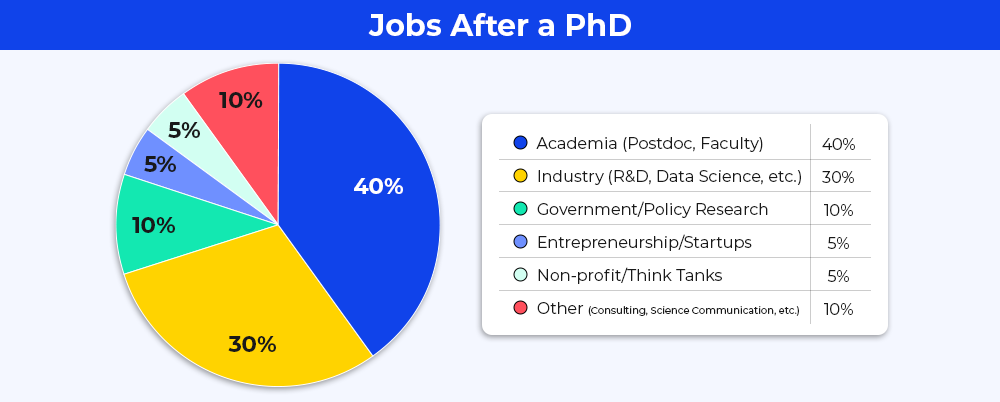Expert Interviews
- University Reviews
- Career Guide
 Video Counseling
Video CounselingImportant Facts
- Ask any Question - CV Forum

How to Cite A PhD Thesis? An Extensive Guide
Komal Jain Jul 22, 2025 1.1K Reads

Writing a PhD thesis is arguably the most intellectually demanding task in academic life. A PhD, essentially, is your original work, your contribution to the body of knowledge in the specific field that you have chosen for study. It is based on your research, theories, models, methodologies, and findings. Referencing is not just a procedure; it is part of academic integrity, scholarly communication, and intellectual honesty.
What is Citation and Why is it Necessary?
A citation is the attribution of ideas, facts, data, or direct quotations contained in your research. All types of sources may be cited, including books, journal articles, proceedings, reports, websites, or interviews.
Why Citations are Important:
- Credit and Respect: Gives credit and respect to the original authors and researchers.
- Academic Honesty: Does not plagiarize, which is ethically a very severe offense.
- Evidence and Credibility: Provides evidence of information to support your arguments, and that evidence comes from credible information.
- Scholarly Conversation: Demonstrates you know what has already been done, and your work is contextualized with original research.
- Research Trail: Allows others to follow your research and verify your statements.
When and What to Cite
- While understanding how to cite is also important, so is having an understanding of when you should cite.
- Word-for-word quoting: Any word-for-word quote from another source needs to be cited and referenced.
- Paraphrasing or summarizing: Even if you have changed the words of someone else's ideas
- When using data, statistics, or figures, if used by the person.
- When working based on someone's theoretical model or structure.
What You Do Not Need to Cite:
- Common knowledge: Commonly known facts or maxims.
- Your original ideas: If they already appeared in print.
- Citation Styles: There are quite a few citation styles used in academia. The appropriate one for your thesis would vary based on your course and university guidelines.
Tools and Software to Organize Citations
Manually managing hundreds of citations takes a long time, and there is a lot of room for error. Fortunately, there are a few extremely useful tools that can help you do this:
- Zotero
- Free, open-source software.
- Works with Word and Google Docs.
- Automatically creates citations and bibliographies.
- Mendeley
- Elsevier-owned.
- Reference manager and academic network.
- Can annotate PDFs and sync across devices.
- EndNote
- An advanced tool for large research projects.
- Very useful in the medical and science fields.
- Subscription-required tool.
- BibTeX (for LaTeX users)
- Typically used by researchers in computer science, math, and physics.
- Simplifies bibliography formatting in LaTeX documents.
- Google Scholar
- Simple and fast citation generator.
- Provides citations in APA, MLA, Chicago, etc.
Tip: Organize your reference library and save in folders (by chapter, topic, or method).

Top Tips for Utilizing Citations in a PhD
- Track from Day 1: Start to grow your bibliography from day one. Each time you read a paper, you save that citation in your reference manager.
- Consistency: Use one citation style for the entire thesis unless there is a necessity to change style for your university.
- Cite Wisely: Cite the key foundational works in your research area.
- Quote Sparingly: Only quote directly when you want to use the exact words (e.g., definitions, theoretical assertions).
- Paraphrase Well: Digest the paper's idea as a whole, digest that, and then paraphrase in your own words. Cite the source.
- Continue to Keep Notes of Your Sources: Keep a research journal or summary for every source: what it is about, what it argues, its strengths and weaknesses, and why it is at all relevant to your thesis.
- Check Again Before Submission: Make sure all in-text citations are represented as an entry in your bibliography or your list of references. Use citation-checking software to ensure you make no errors.
Six Common Citation Errors to Avoid
- Plagiarism: Careless plagiarism can lead to serious penalties. Always give credit to the sourceseven when paraphrasing.
- Incomplete References: Ensure that every reference has all the information required, including author, year, title, journal, volume, pages, etc.
- Inconsistency: Do not alternate between citation styles. Use one style consistently throughout your thesis.
- Overcitation: Do not cite many sources for straightforward statements, except if doing a systematic review.
- Undercitation: Failing to cite sufficiently can result in your research looking uninformed. Always acknowledge landmark works.
Citing Non-Traditional Sources
You might get sources other than books and journals. Here's what to do with them:
- Websites: Utilize reputable websites (.edu, .gov, .org). Provide author, publication date, title, and URL.
- Interviews and Personal Communication: Usually cited in-text only (e.g., (J. Smith, personal communication, May 3, 2024)).
- Social Media: Quote tweets, blog entries, or YouTube postings if necessary, with complete metadata.
- Datasets and Software: Credit data repositories, software tools, and codebases.
Citing in Different Parts of the Thesis
- Introduction
- Cite background studies, motivations, and groundwork.
- Literature Review
- Most citation-heavy section.
- Compare, contrast, and discuss several studies.
- Methodology
- Cite other researchers' methods, software tools, and procedures.
- Results and Discussion
- Compare your results to existing literature.
- Conclusion
How Examiners View Citations
Your examiners will assess how you’ve positioned your research within the broader academic landscape. They will expect:
- A comprehensive, up-to-date literature review.
- Clear referencing of appropriate theories and models.
- Proper source acknowledgment throughout the thesis.
- No plagiarism or excessive dependency upon one author.
- A well-cited, strong thesis reflects an informed and reliable researcher.
Scope After PhD: Exploring Career Opportunities Beyond the Doctorate
Graduating with a PhD is a major scholarly achievement. It is the culmination of years of dedicated research, mental development, and resilience. Yet for most graduate students and new graduates, a frequent question arises: What is next after a PhD?
Those were the days when a PhD was considered solely as a credential to secure employment in academia. Now, PhDs are required across industries from research, higher education, to industry, government, entrepreneurship, and beyond. This blog covers the extent following a PhD, with career choices, opportunities to develop, and how to build a meaningful post-PhD career.

Note: The data is provided according to the survey, and it can vary.
- Academic Careers
a) Postdoctoral Research: A postdoc is a temporary role focused on extending knowledge and publishing work. It's often a transition to a tenure-track professorial role.
- Scope:
- Publish research articles
- Work with others worldwide
- Build a teaching and research record
b) Faculty Jobs: PhDs may occupy the following roles:
- Scope: Assistant Professor
- Lecturer
- Research Fellow
- Research institutions
- Liberal arts colleges
- Research and Development in Industry: PhDs are highly sought after in industry R&D roles as they have intensive problem-solving expertise and technical know-how.
Industries actively looking for PhDs:
Pharmaceuticals and Biotechnology:
- Artificial Intelligence and Data Science
- Material Science and Nanotechnology
- Automotive and Aerospace
- Energy and Sustainability
- Corporate & Consulting Roles: Various companies hire PhDs for their problem-solving abilities and ability to solve complex problems.
- Career Options: Management Consulting: Strategy roles in companies like McKinsey, BCG, or Bain
- Technology Consulting: IBM, Deloitte, Accenture advisory roles
- Corporate Strategy: Strategic planning roles in large companies
- Product Management: In technology companies and firms, especially in AI, EdTech, or biotech
- Government & Policy Making: PhDs can play a valuable role in shaping public policy, especially in the domains of science, education, technology, and the environment.
- Entrepreneurship and Startups: PhDs tend to be founders, leveraging their rich domain knowledge to start new products or services.
- Writing, Publishing, and Science Communication: You may enjoy these fields if you enjoy taking complex ideas and breaking them down into simple, easy-to-share terms.
- Data Science and Artificial Intelligence: PhDs with quantitative or computational skills (physics, math, computer science, economics) are likely to transition to data-driven roles.
- International Careers: A PhD opens up numerous international career possibilities, especially in:
- Teaching & Academic Administration: And if you are an education lover, research is not the only possibility:
- Non-Traditional and Creative Paths: A PhD is not a limitation can be the launching pad for non-traditional careers.
Pursue DBA for A Successful Career: An Alternative Option to PhD
While doing a PhD, the student needs to do various things like thesis, viva, citations, and more, and it is also mandatory to pass all these things; only then will they get the degree and a Dr. title. However, if you pursue an online DBA(Doctorate of Business Administration), then you will get the Dr. title in a short period. This course is not available in India, but there are many top-ranked universities that provide this program, and it will be valid in India and other countries as well. However, it is advisable that the candidates, before taking admission they must check approvals of the universities.
Here is the list of Universities that are offering this course are mentioned below for reference:
|
University |
Program |
Fees (INR) |
|
Birchwood Online University |
DBA Online |
₹6,00,000 |
|
Golden Gate University |
DBA Online |
₹8,14,000 |
|
Rushford Business School |
DBA Online |
₹8,12,500 |
|
ESGCI International School of Management Paris |
DBA Online |
₹8,14,000 |
|
EIMT |
DBA Online |
₹5,50,000 |
|
Swiss School of Business Management |
DBA Online |
₹7,50,000 |
|
Edgewood College |
DBA Online |
₹7,00,000 |
Note: The fees might vary.
Conclusion
Citations are not simply courtesy; they are the DNA of your PhD thesis. Citations sample your scholarly breadth, discipline in ethical practice, and rigour of thinking. Learning to use citations right will improve your writing and will also provide credence and intention to your research.
Whether you are at the start of your PhD or are nearing the submission stage, citation skills form an essential foundation. Take the time to research the relevant tools, know the different styles, and maintain consistency in documenting references. With a solid paper trail in your documentation, you will contribute a solid, respected contribution to the field.
FAQs (Frequently Asked Questions)
References provide a backing for your work from previous research, locate other researchers, and prevent plagiarism. They also indicate you are cognizant of the context of research and enhance credibility for the arguments.
You need to cite a source when:
- Quoting someone else's words word for word
- Paraphrasing someone else's idea or argument
- Using data, tables, or statistics from another source - Citing a theory, model, or earlier study/ findings in research
Your citation style of choice will be determined by the institution and field guidelines. Popular styles include:
- APA (Psychology, Social Sciences)
- MLA (Literature, Humanities)
- Chicago (History)
- Harvard (Business, Social Sciences)
- IEEE (Engineering, Computer Science)
- Always check your institution's favourite style.
- In-text referencing is utilized in your real writing to show where you've derived particular information (e.g., Smith, 2020).
- A bibliography or reference list is placed at the end of the thesis that includes full details for all the sources you've utilized so that readers can find them.
Use a reference management tool like Zotero, Mendeley, EndNote, or BibTeX (for LaTeX users). They help you across managing references, making citations, and formatting bibliographies automatically. Use a reference management tool like Zotero, Mendeley, EndNote, or BibTeX (for LaTeX users). They help you manage references.
It is advisable to shun Wikipedia or blog posts as primary sources of information since they are non-peer-reviewed and non-scholarly. Instead, utilize academic journals, books, or official reports. While these may be utilized, they can be used to familiarize oneself with an issue before determining the appropriate sources of information to cite.
There is no set number, but a PhD thesis will usually have several hundred references, particularly in the literature review. It's not quantity, but quality. Use only the most pertinent, current, and authoritative sources for your area of study.
Yes, you can cite your earlier published work, but be honest and clearly identify what is your earlier contribution. In case of collaborative work, mention your contribution and takethe coauthor'sr consent if necessary.
- Failure to cite paraphrased content
- Variation in the use of styles of citation styles
- Citation of bad or obsolete sources
- References are lacking in the bibliography
- Overuse of direct quotation at the expense of paraphrasing
- Relying on a single source
Use plagiarism detection software such as Turnitin, Grammarly Premium, or institutional software.Double-check in-text citations and references manually for accuracy. Have it proofread by your supervisor or through peer review to catch any citation mistakes that might have gone unnoticed.

By Komal Jain
5 Years of Experience / Storyteller / Research-driven Writer
Passionate about digital marketing with a creative flair for content creation.Experienced Always eager to learn, grow, and make a meaningful impact in the digital space.
Every query is essential.
Our team of experts, or experienced individuals, will answer it within 24 hours.
Recommended for you
Tired of dealing with call centers!
Get a professional advisor for Career!
LIFETIME FREE
Rs.1499(Exclusive offer for today)

Pooja
MBA 7 yrs exp

Sarthak
M.Com 4 yrs exp

Kapil Gupta
MCA 5 yrs exp
or



Career Finder
(Career Suitability Test)
Explore and Find out your Most Suitable Career Path. Get Started with our Career Finder Tool Now!
ROI Calculator
Find out the expected salary, costs, and ROI of your chosen online university with our free calculator.
